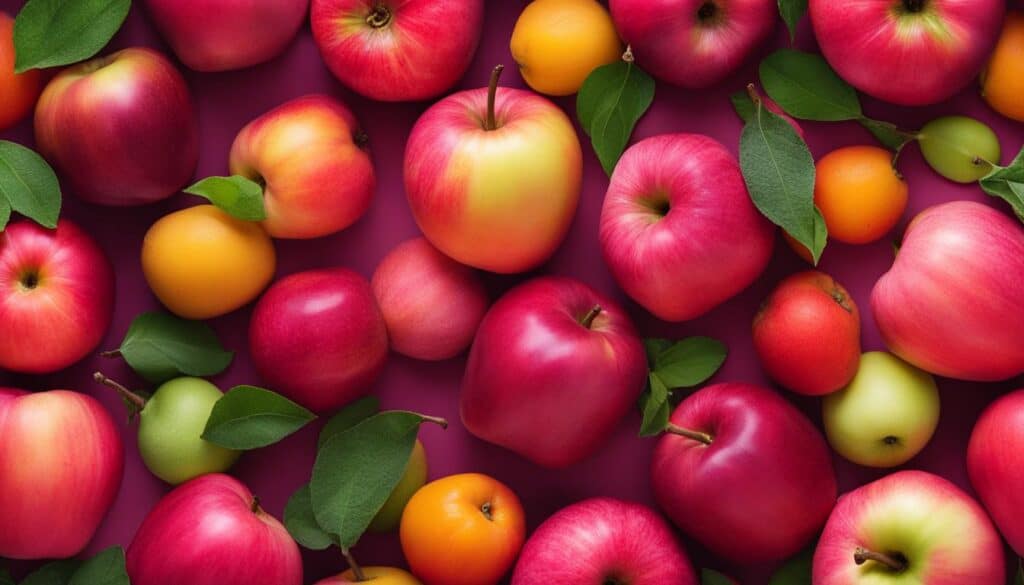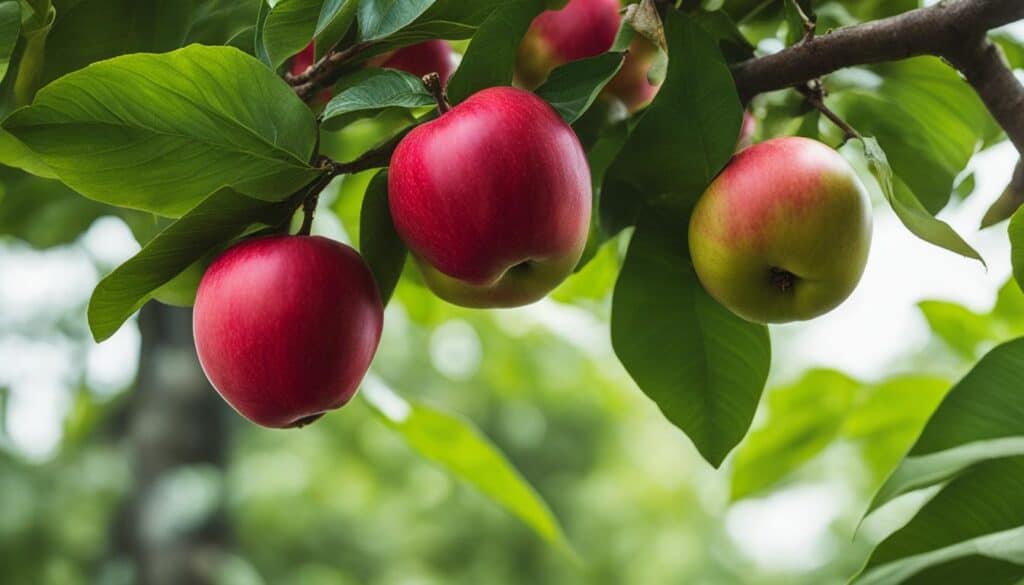As a fan of tropical fruits, I am always on the lookout for new and exciting flavors to tantalize my taste buds. That’s why I was thrilled when I discovered the Malay Apple, also known as the wax apple, rose apple, or water apple. This unique fruit, originating from Malaysia and now a local favorite in the Caribbean, has captured my attention with its crispness, juiciness, and potential health benefits.
The Malay Apple may not have a strong flavor, but its refreshing qualities make it a perfect treat for a hot day. Whether enjoyed fresh, added to salads, or used in beverages, this fruit adds a delightful crunch and a burst of juiciness to every bite. But it’s not just its taste that makes the Malay Apple special. It is also rich in fiber and antioxidants, making it a healthy addition to your diet.
Key Takeaways:
- The Malay Apple, also known as the wax apple, rose apple, or water apple, is a tropical fruit that originates from Malaysia.
- It is characterized by its crispness and juiciness, making it a refreshing treat on a hot day.
- The fruit is typically eaten fresh or used in salads and beverages.
- The Malay Apple is a good source of fiber and antioxidants, offering potential health benefits.
- Its cultivation requires warm climates, well-drained soil, and plenty of sunlight.
The Health Benefits of Malay Apple
The Malay Apple, also known as the wax apple, rose apple, or water apple, not only delights the taste buds with its crispness and juiciness but also offers a range of health benefits. Let’s explore the nutritional value and health advantages of this tropical fruit.
Rich in Fiber for Healthy Digestion
The Malay Apple is a good source of dietary fiber, which plays a crucial role in maintaining a healthy digestive system. Fiber adds bulk to the stool and helps prevent constipation. It also aids in regulating bowel movements and promoting a healthy gut. Including Malay Apple in your diet can help improve digestion and prevent digestive disorders.
Boosts Immune System with Vitamin C
Vitamin C is known for its immune-boosting properties, and the Malay Apple happens to be a good source of this essential nutrient. Vitamin C helps strengthen the immune system, protecting the body against common illnesses and infections. It also supports the production of collagen, which promotes healthy skin and aids in wound healing.
| Nutrient | Amount per 100g |
|---|---|
| Calories | 25 |
| Fiber | 2.9g |
| Vitamin C | 22mg |
| Potassium | 52mg |
Antioxidant-Rich for Cellular Health
The Malay Apple contains antioxidants that help protect the body against cellular damage caused by harmful free radicals. These antioxidants, such as polyphenols and flavonoids, have been linked to a reduced risk of chronic diseases, including heart disease and certain types of cancer. Including Malay Apple in your diet can contribute to overall health and wellbeing.
With its fiber content, immune-boosting vitamin C, and antioxidant properties, the Malay Apple is a nutritious fruit that can be enjoyed as part of a healthy and balanced diet.
Cultivating Malay Apples

When it comes to cultivating Malay Apples, it is essential to provide the ideal conditions for these tropical fruits to thrive. They are typically grown in tropical and subtropical regions with warm climates, as they require plenty of sunlight and well-drained soil. Malay Apple trees can reach impressive heights of up to 20 meters, and they have a year-round fruiting season.
To ensure the healthy growth of Malay Apple trees, it is crucial to provide them with sufficient water and regular fertilization. Watering the trees deeply and consistently helps to establish strong roots and maintain optimal moisture levels. Fertilizing the trees with a balanced blend of nutrients will promote vigorous growth and enhance fruit production.
Malay Apples can be propagated through both seeds and cuttings. Growing from seeds allows for genetic variation, while growing from cuttings ensures the preservation of desirable traits. Whichever method is chosen, it is important to select high-quality seeds or healthy cuttings with no signs of disease or damage.
Table: Malay Apple Cultivation Tips
| Aspect | Tips |
|---|---|
| Climate | Grow in tropical or subtropical regions with warm climates. |
| Soil | Ensure well-drained soil for optimal growth. |
| Watering | Provide regular and deep watering to establish strong roots. |
| Fertilization | Apply a balanced blend of nutrients regularly to promote healthy growth. |
| Propagation | Choose high-quality seeds or healthy cuttings for successful propagation. |
With proper care and attention, Malay Apple trees can yield bountiful harvests and provide enthusiasts with a continuous supply of these delightful tropical fruits.
Malay Apple Recipes and Culinary Uses
The versatile Malay Apple can be used in a variety of culinary creations, adding a refreshing and unique touch to dishes. Here are some delicious recipes and culinary uses for this tropical fruit:
Fruit Salad with Malay Apple Slices
Create a colorful and flavorful fruit salad by adding sliced Malay Apple to the mix. The crisp texture and mild sweetness of the fruit complement other fruits beautifully. Combine slices of Malay Apple with tropical favorites like mango, pineapple, and papaya. Drizzle with a citrusy dressing made from lime juice, honey, and a pinch of salt. This bright and refreshing fruit salad is perfect for a healthy breakfast or a light dessert.
Malay Apple Smoothie
Blend Malay Apple with your choice of fruits, yogurt, and a splash of coconut water to create a creamy and refreshing smoothie. The natural juiciness of the Malay Apple adds a burst of flavor to the smoothie, while the creamy consistency makes it satisfying and filling. Experiment with different combinations of fruits like banana, strawberry, and kiwi to find your favorite Malay Apple smoothie recipe.
Malay Apple Chutney
Add a tangy and spicy kick to your meals with a homemade Malay Apple chutney. Combine diced Malay Apple with onions, ginger, garlic, vinegar, sugar, and spices like cumin and chili flakes. Simmer the mixture until the flavors meld together and the chutney thickens. This versatile condiment pairs well with grilled meats, roasted vegetables, and even cheese. The Malay Apple chutney is a delicious way to add a touch of tropical flavor to your favorite dishes.
| Recipe | Ingredients | Instructions |
|---|---|---|
| Fruit Salad with Malay Apple Slices | – Malay Apple – Mango – Pineapple – Papaya – Lime juice – Honey – Salt | 1. Slice the Malay Apple and other fruits. 2. In a bowl, combine the fruits. 3. In a separate bowl, whisk together the lime juice, honey, and salt. 4. Drizzle the dressing over the fruit salad and toss gently to coat. 5. Serve immediately and enjoy. |
| Malay Apple Smoothie | – Malay Apple – Banana – Strawberry – Kiwi – Yogurt – Coconut water | 1. Blend the Malay Apple, banana, strawberry, kiwi, yogurt, and coconut water together until smooth. 2. Adjust the consistency by adding more coconut water if desired. 3. Pour into glasses and serve chilled. |
| Malay Apple Chutney | – Malay Apple – Onion – Ginger – Garlic – Vinegar – Sugar – Cumin – Chili flakes | 1. Peel and dice the Malay Apple, onion, ginger, and garlic. 2. In a saucepan, combine the Malay Apple, onion, ginger, garlic, vinegar, sugar, cumin, and chili flakes. 3. Bring the mixture to a boil, then reduce the heat and simmer for 20-30 minutes, or until the chutney thickens. 4. Remove from heat and let cool. 5. Transfer the chutney to a sterilized jar and store it in the refrigerator. 6. Use the Malay Apple chutney as a condiment or flavor enhancer for various dishes. |
These are just a few examples of the many ways you can incorporate Malay Apple into your culinary repertoire. Get creative in the kitchen and explore the unique flavors and textures that this tropical fruit has to offer. Whether it’s in a fruit salad, a smoothie, or a chutney, the Malay Apple is sure to add a delightful twist to your dishes.
Malay Apple Tree and Fruit Characteristics

The Malay Apple tree is a tropical fruit tree that is native to Malaysia and thrives in warm and wet conditions. It is known for its glossy leaves and small, fragrant flowers. The tree can reach a height of up to 20 meters and produces bell-shaped or pear-shaped fruit. The fruit of the Malay Apple tree has a smooth and shiny skin that can range in color from green to red. Inside, the fruit has a crisp and juicy flesh, similar to an apple but with a milder flavor. The fruit is usually white or pale yellow in color, with a slight sweetness.
When fully matured, the Malay Apple fruit is ready for harvest. It is important to pick the fruit at the right time to ensure optimal flavor and texture. The fruit should be firm to the touch and have a vibrant color. If the fruit is too ripe, it may become mushy and lose its crispness. The Malay Apple tree is known for its continuous fruit production, allowing for a steady supply of fresh fruit throughout the year.
Malay Apple trees can be grown in tropical and subtropical regions with warm climates. They require well-drained soil and plenty of sunlight for optimal growth. The trees can be propagated through seeds or cuttings, making them relatively easy to cultivate. With proper care and maintenance, Malay Apple trees can thrive and produce abundant fruit.
Below is a table summarizing the characteristics of Malay Apple trees and fruit:
| Tree Characteristics | Fruit Characteristics |
|---|---|
| Glossy leaves | Bell-shaped or pear-shaped |
| Small, fragrant flowers | Smooth and shiny skin |
| Can reach a height of up to 20 meters | Crisp and juicy flesh |
| Continuous fruit production | White or pale yellow color |
| Slight sweetness |
The Malay Apple tree and its fruit offer a unique combination of visual appeal and delightful flavors. Whether enjoyed fresh from the tree or incorporated into various culinary preparations, the Malay Apple is a tropical treasure that is sure to please the palate.
Nutritional Value of Malay Apple

The Malay Apple, also known as the wax apple, is not only a delicious and refreshing fruit but also a nutritious addition to your diet. Let’s take a closer look at the nutritional value of this tropical delight:
Essential Vitamins and Minerals
The Malay Apple is packed with essential vitamins and minerals that contribute to a healthy diet. It is a good source of vitamin C, which supports immune function and promotes collagen production for healthy skin. The fruit also contains vitamin A, which is essential for good vision and a strong immune system. In addition, Malay Apples are rich in potassium, an important mineral that helps regulate blood pressure and maintain proper heart function.
Dietary Fiber for Digestive Health
Including Malay Apples in your diet can help promote a healthy digestive system. The fruit is a good source of dietary fiber, which aids in digestion and helps prevent constipation. Fiber also contributes to feelings of fullness, making it a satisfying snack or addition to meals.
Antioxidant Powerhouse
Malay Apples are rich in antioxidants, which help protect the body against harmful free radicals and reduce the risk of chronic diseases. These antioxidants also contribute to the fruit’s vibrant colors, with red-skinned varieties containing higher levels of these beneficial compounds.
| Nutrient | Amount per 100g |
|---|---|
| Calories | 47 |
| Carbohydrates | 12g |
| Fiber | 3g |
| Vitamin C | 22% of Daily Value (DV) |
| Vitamin A | 6% of DV |
| Potassium | 4% of DV |
As you can see from the table above, Malay Apples are low in calories and fat, making them a healthy snack option. They provide a good amount of dietary fiber, vitamin C, and vitamin A. So next time you’re looking for a refreshing and nutritious treat, reach for a tasty Malay Apple!
Malay Apple in Traditional Medicine
In traditional medicine, the Malay Apple is highly regarded for its potential health benefits. It has been used for centuries to treat various ailments and promote overall well-being. One of the most common uses of the fruit is for digestive disorders. The high fiber content helps regulate bowel movements and alleviates symptoms of diarrhea and indigestion.
Moreover, the Malay Apple is believed to have properties that can provide relief for sore throat and cough. Traditional healers often recommend consuming the fruit or its juice to soothe inflammation and reduce discomfort. The natural antioxidants present in the fruit may also contribute to its anti-inflammatory effects.
Additionally, some traditional healers suggest that the Malay Apple can help regulate blood sugar levels. While more research is needed to fully understand its potential in managing diabetes, it is believed that the fruit’s fiber content and antioxidants may play a role in controlling blood glucose levels.
The Medicinal Benefits of Malay Apple:
- May aid in digestion and relieve symptoms of diarrhea and indigestion
- Potential to alleviate sore throat and cough
- Possibly helps regulate blood sugar levels
- Rich in antioxidants with potential anti-inflammatory properties
It is important to note that while the Malay Apple has a long history of traditional use, scientific research is still ongoing to support these medicinal claims. However, its inclusion in traditional medicine practices speaks to its potential therapeutic properties and highlights the diverse applications of this tropical fruit.
Malay Apple in Cultural Significance

The Malay Apple holds a special place in the cultural traditions of regions where it is grown. In Malaysia, this fruit is revered as a symbol of abundance and prosperity. It is often used in festive celebrations and offerings, adding a touch of auspiciousness to the occasion. The Malay Apple is cherished not only for its refreshing taste but also for the cultural significance it represents.
In the Caribbean, the Malay Apple is a beloved fruit, particularly during the summer months. Its crispness and juiciness make it a perfect choice for beating the heat. Whether enjoyed fresh or incorporated into local recipes, this fruit brings joy and satisfaction to those who indulge in its flavors. Its popularity has even led to its presence in various folklores and traditional songs, highlighting its cultural significance in the Caribbean.
The Importance of Malay Apple in Local Traditions
While the Malay Apple is celebrated for its taste and versatility, it is also deeply embedded in local traditions. Its distinctive qualities make it an integral part of culinary heritage in the regions it is cultivated. Whether used in fruit salads, juices, or as a topping for desserts, the Malay Apple enhances the flavors and textures of traditional dishes.
The Malay Apple has become synonymous with abundance and prosperity in Malaysia. It is often included in festive celebrations and offerings.
In the Caribbean, the Malay Apple is a popular fruit during the summer months, enjoyed for its refreshing properties and added to traditional dishes.
As communities continue to embrace their cultural roots, the Malay Apple remains an important symbol of heritage and identity. Its presence in culinary traditions and cultural practices showcases the deep connection between people and the land they inhabit. By cherishing and preserving the Malay Apple, communities preserve their cultural heritage for future generations to enjoy.
Conclusion
In conclusion, the Malay Apple is a tropical fruit that offers a delightful combination of crispness, juiciness, and mild flavor. It is not only a refreshing treat on a hot day but also a fruit that brings a range of health benefits.
Whether you’re looking to improve your digestion, boost your immune system, or protect your cells from damage, the Malay Apple has got you covered. It is rich in fiber, vitamin C, and antioxidants, making it a nutritious addition to your diet.
Not only is the Malay Apple good for your health, but it also offers culinary versatility. From fruit salads to beverages, jams, and pickles, there are endless possibilities to explore with this tropical gem.
Furthermore, the cultural significance of the Malay Apple adds to its charm. Whether you’re in Malaysia, where it symbolizes abundance and prosperity, or in the Caribbean, where it’s a summer favorite, the Malay Apple brings joy and tradition to different regions.
FAQ
What is a Malay Apple?
The Malay Apple, also known as the wax apple, rose apple, or water apple, is a tropical fruit that is native to Malaysia and is now popular in the Caribbean. It is known for its crispness and juiciness, making it a refreshing treat.
What are the health benefits of Malay Apple?
Malay Apple is a good source of fiber, which aids in digestion and helps maintain healthy blood sugar levels. It also contains antioxidants that help protect against cellular damage and reduce the risk of chronic diseases. Additionally, Malay Apple is rich in vitamin C, which boosts the immune system and promotes healthy skin.
How do you cultivate Malay Apples?
Malay Apple trees are typically grown in tropical and subtropical regions with warm climates. They require well-drained soil, plenty of sunlight, and regular watering and fertilization. The trees can be propagated through seeds or cuttings.
How can Malay Apples be used in cooking?
Malay Apples can be eaten fresh, added to fruit salads, juiced or blended for beverages and smoothies. In some cuisines, they can be cooked down to make jams, jellies, and sauces. The fruit can also be pickled or used as a topping for desserts and ice cream.
What are the characteristics of Malay Apple trees and fruit?
Malay Apple trees have glossy leaves and small, fragrant flowers. The fruit is bell-shaped or pear-shaped, with a smooth and shiny skin that can range in color from green to red. Inside, the fruit has crisp and juicy white or pale yellow flesh with a slight sweetness.
What is the nutritional value of Malay Apple?
Malay Apple is low in calories and fat, making it a healthy snack option. It is a good source of dietary fiber, vitamins C and A, and potassium. The fruit is also rich in antioxidants, which promote overall health.
What are the potential health benefits of Malay Apple in traditional medicine?
Malay Apple is believed to have various health benefits in traditional medicine. It is often used to treat digestive disorders, sore throat, and cough. Some traditional healers believe it can help regulate blood sugar levels and reduce the risk of diabetes, although more research is needed.
What is the cultural significance of Malay Apple?
Malay Apple holds cultural significance in various regions where it is grown. In Malaysia, it is considered a symbol of abundance and prosperity and is often included in festive celebrations and offerings. In the Caribbean, it is a popular fruit during the summer months and is featured in local folklore and traditional songs.





Leave a Reply